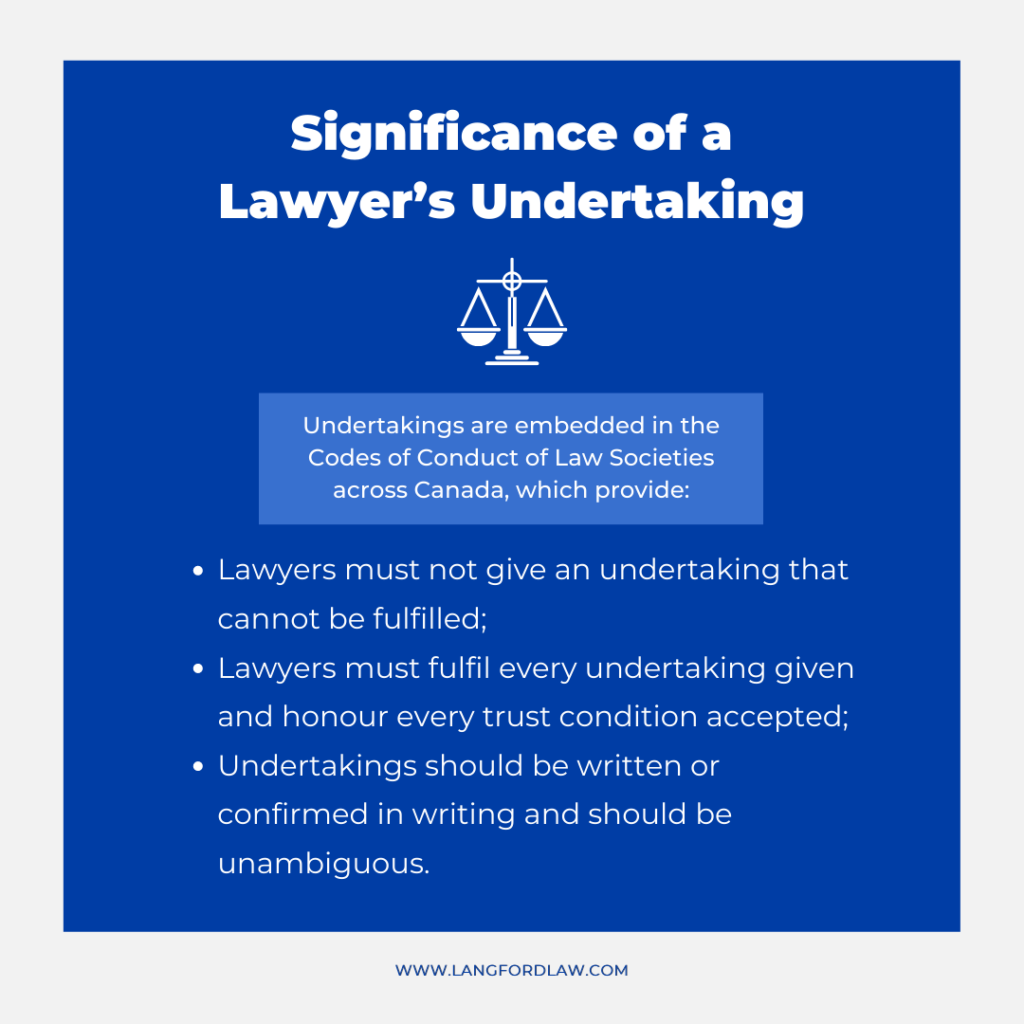Significance of a lawyer’s undertaking
Undertakings are essential to the practice of law and lawyers rely on them often for the transaction of business, as well as dispute resolution. But what are they and why are they important?
What is an undertaking?
An undertaking is a lawyer’s promise that the recipient relies upon in giving up a right or in performing an act which the recipient would not have done, were it not for the lawyer’s promise. These promises are binding and must be kept.
Undertakings are embedded in the Codes of Conduct of Law Societies across Canada, which provide:
- lawyers must not give an undertaking that cannot be fulfilled;
- lawyers must fulfil every undertaking given and honour every trust condition accepted – not doing so could be considered professional misconduct; and
- undertakings should be written or confirmed in writing and should be unambiguous.

What happens when a lawyer gives an undertaking to another lawyer?
In Snowball v Ham Estate, 2021 ABQB 497, the Alberta Court of Queen’s Bench dealt with an undertaking given by one lawyer to another regarding the payment of fees.
In that case, two senior lawyers, Laura Snowball and Hugh Ham, worked together on a file from the spring of 2017 into the fall of 2018, with payment of damages and contingency fees in early 2019. A few months before the contingency fee payment was to be released, the client’s other senior lawyer asked Mr. Ham and Ms. Snowball where the money should go once the funds could be released. Mr. Ham replied, advising that the money should be paid to him and giving an undertaking to pay Ms. Snowball. The contingency fee payment was expected in mid-November 2019. On October 13, 2019, Ms. Snowball invoiced Mr. Ham for half of the contingency amount. Mr. Ham died a week later on October 20, 2019. Ms. Snowball has never been paid for her work.
The Trial Judge held that, while there can be no doubt about the seriousness of a solicitor’s undertaking, he doubted that it was Mr. Ham’s intention was to give a lawyer’s undertaking under the Code of Conduct. Instead, the Judge held that Mr. Ham was acknowledging a personal debt. Further the Trial Judge held that even if the undertaking was made in Mr. Ham’s professional capacity, it was unenforceable due to the uncertainty in its terms. The Trial Judge issued an order directing the funds to be released to Mr. Ham’s Estate.
Ms. Snowball appealed. Pending that appeal, E. Jane Butcher, a Barrister with Langford Law, sought a stay barring release the funds before the appeal could be heard, due to the fact that Mr. Ham’s Estate is insolvent. In her Reasons for Decision, The Honourable Justice Jo’Anne Strekaf of the Court of Appeal ruled that Ms. Snowball would suffer irreparable harm due to the Estate’s insolvency; and the Estate may also suffer irreparable harm if it did not have access to funds to defend the appeal. Balancing those interests, the Court of Appeal granted a partial stay to enable the Estate to use a portion of the funds defend the appeal, while the balance of the funds remain in trust pending the hearing of the appeal.
Ms. Butcher’s advocacy has given her client renewed hope and an opportunity to be fairly compensated for her work. Moreover, this case has been closely watched by members of the bar as it deals with undertakings, an important tool for lawyers in both business and litigation matters.
If you have any questions or comments on this article, please contact us at info@langfordlaw.com.
